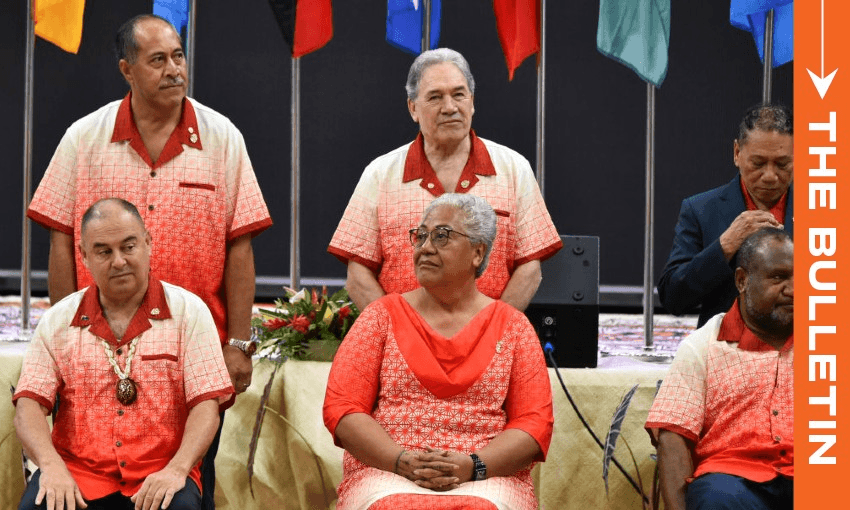Mark Brown’s trip to China risks damaging the close bond between the Cook Islands and NZ, explains Stewart Sowman-Lund for The Bulletin.
To receive The Bulletin in full each weekday, sign up here.
‘Significant concern’
New Zealand’s tight knit relationship with the Cook Islands is at risk after the nation’s prime minister Mark Brown headed off to China to sign a new strategic partnership. A statement yesterday from foreign minister Winston Peters, reported by 1News’ Pacific correspondent Barbara Dreaver, said the government had “significant concern” after a lack of consultation on the deal and New Zealand had asked for more detail ahead of Brown’s trip. “We therefore view the Cook Islands as having failed to properly consult New Zealand with respect to any agreements it plans to sign this coming week in China,” said Peters.
On Friday, Brown told RNZ Pacific that New Zealand had been demanding too much oversight and the relationship between the two countries was meant to be reciprocal. “They certainly did not consult with us when they signed their comprehensive partnership agreement [with China] and we would not expect them to consult with us,” he said. “There is no need for New Zealand to sit in the room with us while we are going through our comprehensive agreement with China.
Cook Islands denies secrecy
Tensions between New Zealand and the Cook Islands have been bubbling away for some time now, as Barbara Dreaver explained in analysis for 1News. Late last year, it was revealed that Brown had been pushing for Cook Islanders to have a separate passport and citizenship while still maintaining its status as a realm country of New Zealand. Our government said that wasn’t possible and the Cook Islands would have to consider total independence in order to achieve this. That’s now off the table, but the talks with China have instead ignited security concerns – something Brown has pushed back on. Speaking to local media before his trip, Brown denied any secrecy in his dealings with China. “We have always conducted our international affairs with integrity and transparency. Every agreement we enter will be in the best interests of the Cook Islands, and our people will be fully informed every step of the way,” he said.
Speaking with RNZ, geopolitics expert Anna Powles said the move by the Cook Islands leader and how it has been responded to will be watched closely by others in the region. “It will be seen as a barometer in the region for how [New Zealand] engages with other Pacific Forum country members,” she said.
China in the Pacific
The broader background of all this is wariness over China’s influence in the Pacific. That’s not new – Chris Hipkins was in Papua New Guinea as prime minister in 2023, for example, as the nation signed up to a new security pact with the United States that was clearly intended as a rebuke of China. Ahead of a visit to Tonga last year, Winston Peters suggested in an interview with the Associated Press that Western nations – including the United States and New Zealand – had allowed a power vacuum to emerge in the Pacific that meant other nations could increase their influence. “If you are not there as an influence, then other influences that don’t share your values might seriously fill the vacuum, and that has happened,” said Peters.
The foreign minister has made it his mission since returning to office in 2023 to reassert New Zealand’s place as part of the Pacific family. By the end of November, he had visited 15 of the 17 Pacific Islands Forum member countries.
Filling the gap
One nation Peters has yet to visit is Kiribati, another Pacific island experiencing a strained relationship with New Zealand. Much like with the situation in the Cook Islands, the diplomatic spat has played out on the record, which has piqued interest around the world (CNN, for example, noted that “Pacific allies don’t usually air their dirty laundry in public”). That same report noted that the spat between Kiribati and the New Zealand government, also due to a diplomatic snub though of a very different nature, highlighted concerns over the “battle for influence in the Pacific between China and Western nations”. China has not had the same barriers to engagement with Kiribati that New Zealand has, despite historic ties as Pacific allies, noted by Andrea Vance in the Sunday Star-Times.
Chinese media also suggested that the nation could be able to a fill a void caused by the change in government in the United States, with the Trump administration freezing aid support and withdrawing from the Paris climate agreement. The US is also expecting to deport a number of undocumented Pasifika migrants, reported the Pacific Media Network, which has some Pacific leaders concerned. Sam Sachdeva looked at the issue of aid for Newsroom Pro this morning (paywalled), with one expert warning New Zealand would have to increase its spend in the Pacific unless we want China to swoop in.
